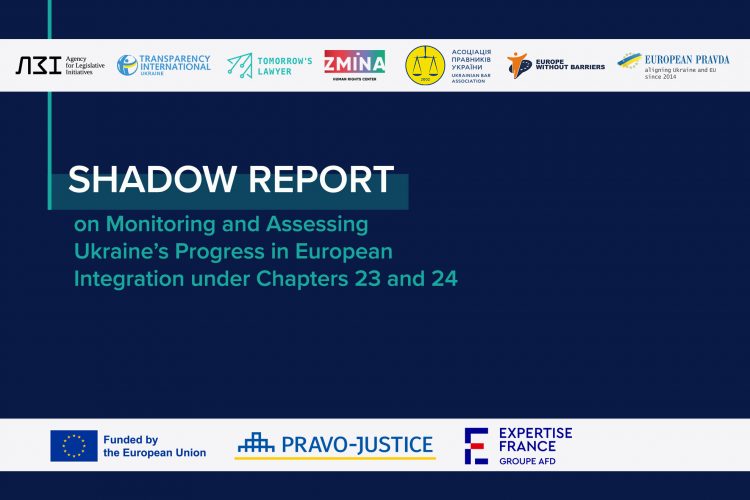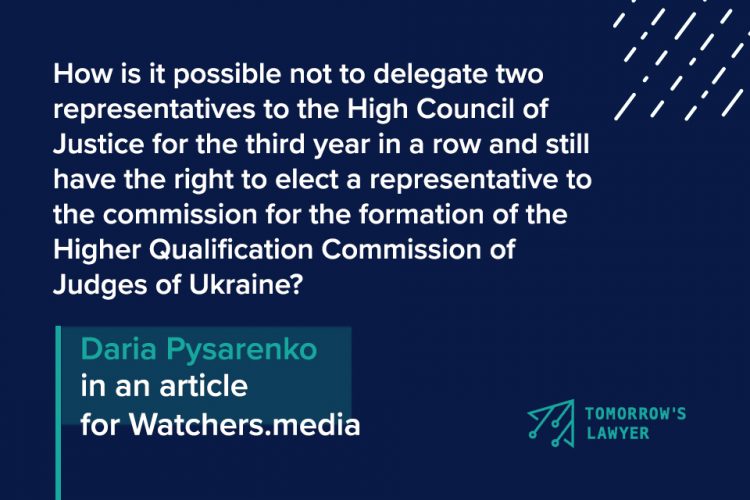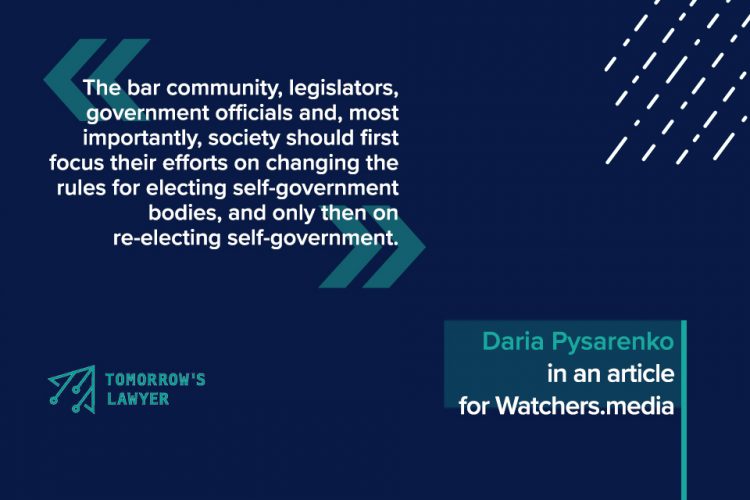
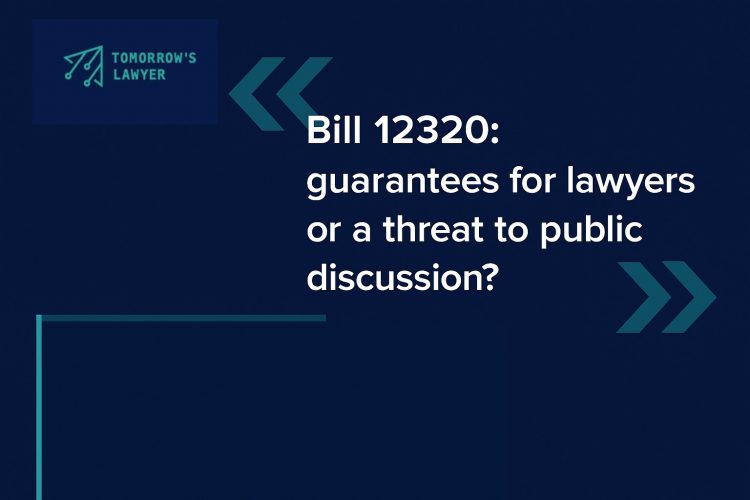
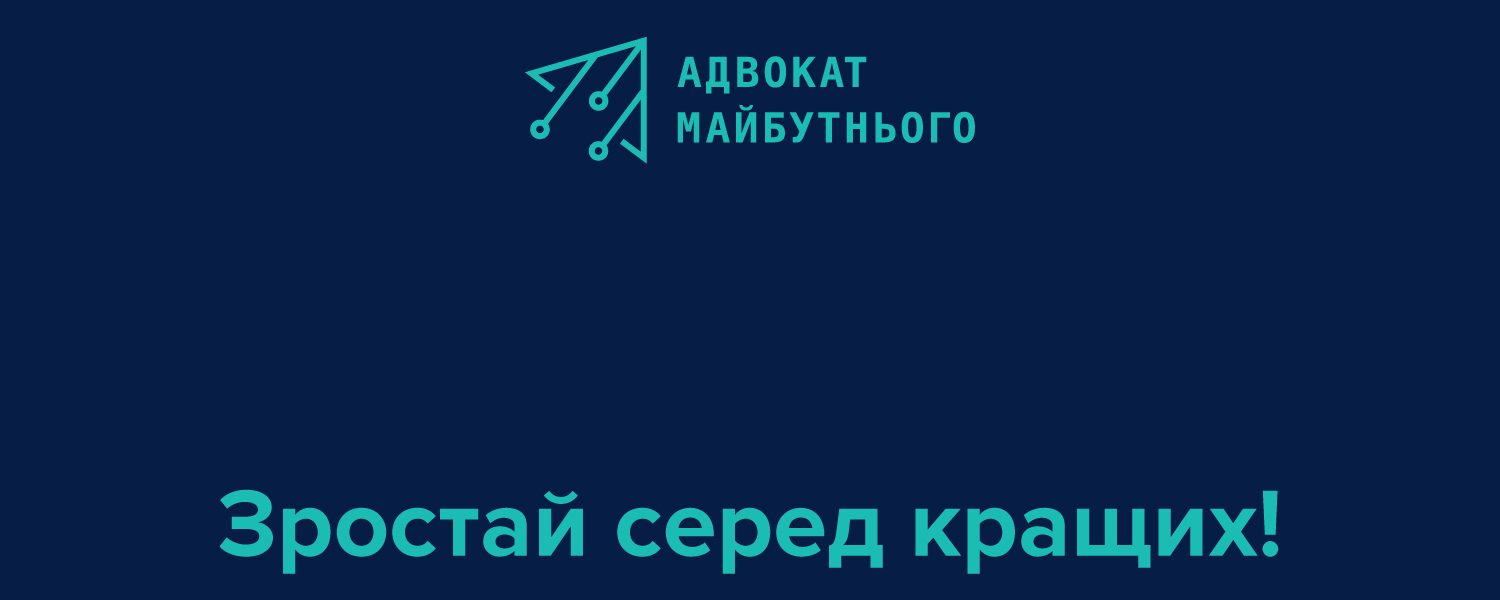
Law 12320: guarantees for lawyers or a threat to public discussion?
Law 12320: guarantees for lawyers or a threat to public discussion?
Daryna Pysarenko, Director of Tomorrow`s Lawyer
in an article for Dzerkalo Tyzhnia
On 16 July 2025, parliament passed Bill No. 12320, which establishes administrative liability for identifying a lawyer with a client and amends Article 397 of the Criminal Code of Ukraine on interference in the activities of a defence lawyer.
‘The road to hell is paved with good intentions’ — this is the first saying that comes to mind when it comes to introducing administrative liability for identifying a lawyer with a client. Such identification is currently a real problem for any country, and this problem always requires an appropriate response from both the state and the bar community.
It should be remembered that Ukraine’s Bar Association is currently in crisis, and its reform is one of the requirements for Ukraine’s path to EU membership. The government’s Roadmap explicitly provides for such a reform, and it is this reform that should become the foundation for strengthening the independence and sustainability of the profession. However, whether the new article of the Code of Administrative Offences will solve the problem of identification or only create new risks remains an open question.
The law has already been sent to the president for signature. And it is this signature that will determine whether the balance of common sense will be preserved or whether we will witness a clash between two principles of a democratic state — the non-identification of a lawyer with a client and freedom of speech.
This will be discussed further below.
Why the problem has become more acute
The problem of identification exists in Ukraine, and it has become particularly acute since 2014, when the Russian-Ukrainian war began. Any criminal charges against Russian military personnel oblige the state to provide protection during criminal proceedings. Thanks to the existence of a system of free legal aid, we adhere to this principle, so all Russian military personnel have protection.
At the same time, society and even participants in court proceedings often mistakenly identify the lawyer with his or her client. There are known cases where lawyers were effectively held responsible for the actions of their clients. A telling example is an episode where a translator openly called a lawyer a ‘traitor’ simply because he was defending a Russian citizen. There have also been increasing cases of lawyers being held responsible for their clients’ actions during mobilisation processes. There have been numerous cases of lawyers being denied access to clients in detention centres and even beaten up.
It should be emphasised here that denying a lawyer access to a client and beating them while performing their professional duties should result in criminal liability under Article 397 of the Criminal Code. According to the current version of the article, liability should arise for any form of obstruction or violation of the legally established guarantees of the lawful activities of a defence lawyer.
What about the statistics on the protection of lawyers?
According to statistics from the prosecutor’s office, despite a sharp increase in the number of criminal proceedings under Article 397 (15 in 2022, 46 in 2023, and another 46 in just eight months of 2024, for a total of 107), there are virtually no suspicions or convictions: since the Unified State Register of Court Decisions was established, only two convictions have been handed down — in 2015 and 2016.
This may indicate two things: the ineffectiveness of the norm itself and the lack of a real mechanism to protect lawyers from illegal interference, as well as the inadequate work of the pre-trial investigation bodies and the prosecutor’s office, which do not ensure that the guilty parties are brought to justice. I am inclined to believe the latter. After all, there are dozens of cases of obstruction of lawyers’ activities reported in the media that clearly fall under criminal law.
Draft law No. 12320 does indeed clarify the provisions of Article 397 of the Criminal Code of Ukraine, and these changes could potentially improve the situation, as specifying the forms of interference in the activities of lawyers will reduce the scope for formal refusals to investigate.
At the same time, the previous wording of the article was hardly an insurmountable obstacle to bringing to justice those who actually prevented lawyers from doing their job. There are grounds for cautiously assuming that the problem lies not only in the content of the provision, but also in the attitude of the representatives of the pre-trial investigation bodies and the prosecution service towards the as an institution. It seems that the lack of effective results is due not so much to gaps in the legislation as to a lack of real desire and proper motivation to conduct full investigations in such cases.
Why the media and civil society activists rose up
Let’s return to administrative liability. The new law, which is almost ready for adoption, also introduces an article to the Code of Administrative Offences on violating the prohibition on identifying a lawyer with a client. This refers to the public identification (linking) of a lawyer with a client, in particular through the media or non-governmental organisations, without the aim of obstructing their activities. Such identification is considered to be pressure on the lawyer, undermining their independence and violating the guarantees of legal practice enshrined in the Law of Ukraine On the Bar.
The regional Bar Council will be responsible for drawing up reports on such identification, and only then will the court decide whether to bring the person concerned to administrative responsibility.
However, it is important to understand that there is an extremely important concept in the legal field — the principle of legal certainty. This refers to the requirement that legal norms be clear, understandable and predictable for their addressees. A person must be able to know in advance what consequences their actions or inaction will have. The principle of certainty requires: first, that the law does not contain overly vague or ambiguous wording; second, that the rules are applied consistently and equally to all; third, that arbitrary or discretionary interpretation of the rules is not allowed.
However, the proposed definition of ‘identification of a lawyer with a client’ is a textbook example of non-compliance with the principle of certainty in law-making. This is evidenced by the conclusion of the Main Scientific and Expert Department of the Verkhovna Rada of Ukraine, as well as the conclusion of the Council of Europe Project ‘Protecting Freedom of Expression and Media Freedom in Ukraine — Phase II,’ prepared at the request of Yaroslav Yurchyshyn, Chairman of the Ukrainian Parliamentary Committee on Freedom of Expression: ‘The current version of the draft law uses an overly broad definition of identification, which poses a potential threat to the coverage of court proceedings in the media.’
- Note to the article of the Code of Administrative Offences: identification of a lawyer with a client — any identification (association, linking) of a lawyer with a client that affects the independent status of the lawyer and/or exerts negative pressure during the performance of legal activities and/or violates the guarantees of legal activities and/or impedes the realisation of the rights of a lawyer provided for by the Law of Ukraine On the Bar
The lack of legal certainty in the proposed article of the Code of Administrative Offences was also emphasised by Viktor Dubovyk, Director General of the Directorate for Legal Policy of the Office of the President of Ukraine, at a round table on ‘Protecting lawyers from being identified with their clients’.
What is the position of international partners?
The CoE conclusion also refers to the Council of Europe Convention on the Protection of the Legal Profession (or ‘legal profession’; an official translation of the Convention from the Ministry of Foreign Affairs is currently pending), adopted by the CoE in May 2025, which has not yet been ratified by any country. Ukraine, like other countries, is on the path to ratification. However, it is already worth discussing the provisions of this Convention and the adaptation of legislation to them.
Part 5 of Article 6 of the Convention states: Parties shall ensure that lawyers do not suffer adverse consequences as a result of being identified with their clients or their clients’ cause. This article shall be applied without prejudice to freedom of expression as protected by the Convention for the Protection of Human Rights and Fundamental Freedoms and domestic law. The explanatory report also emphasises that the provision does not restrict freedom of speech and should be applied with a balance between the protection of lawyers and the right to freedom of expression.
The authors of the Convention, recognising the inevitability of conflicts between freedom of speech and the principle of non-identification of a lawyer with a client, enshrined both guarantees side by side. This is a signal of the need for balance, which a democratic state must ensure.
At a round table on ‘Protecting lawyers from being identified with their clients’ on 8 September, Council of Europe expert Jeremy McBride stressed that identification problems exist in all countries, which is why mechanisms to counteract this are needed. At the same time, he noted that lawyers need protection not only when they are mentioned in the context of a case in which they are involved, but also in cases where this identification has negative consequences.
Roman Zavrsek, Vice-President of the Bar Council of Bars and Law Societies of Europe, emphasises that the balance between the protection of lawyers and freedom of speech must also be taken into account in the explanatory report to the Convention. It states that the negative consequences of identification can manifest themselves in the form of threats, attacks, lawsuits or disciplinary, criminal and administrative proceedings. In other words, we see a list of possible consequences here.
Does the European approach take into account the law that has been adopted but not yet signed?
No. The Convention protects lawyers from specific serious consequences of identification — attacks, threats, persecution — while ensuring a balance with freedom of expression. In contrast, the Ukrainian norm has an overly broad definition of ‘identification,’ which could even cover court reporting. This creates a risk of arbitrary application, conflicts with the right to freedom of expression, and undermines the principle of legal certainty.
The Council of Europe’s conclusion states that there is a risk of disproportionate restrictions on freedom of speech; a threat of self-censorship and a ‘chilling effect’ that could stifle journalism, public scrutiny and public debate in high-profile or politically sensitive cases; and non-compliance with international standards.
At the round table, journalist Danylo Mokryk raised the issue of lawyers’ tactics and their impact on media perception, in particular cases of self-identification or political statements that go beyond professional activity. This issue is more a matter for internal discussion within the bar community and requires separate discussion.
The experience of other countries shows that prohibitions on identification exist only in ‘soft law’ and not at the level of legislation. Therefore, the expediency of introducing a new article into the Code of Administrative Offences is questionable, since the consequences of identifying a lawyer with a client are already provided for in the Criminal Code. Even if we disregard the controversial definition of ‘identification’ in draft law No. 12320, the very need for administrative liability seems unfounded.
It is much more effective to focus on counteracting real violations of lawyers’ rights and guarantees of their activities through proper criminal prosecution. Statistics confirm the existence of such cases, which requires the investigative authorities and the prosecutor’s office to respond appropriately.
In this context, it is important to develop a strategy for lawyer self-government to protect the profession and advocacy in relations with the state. Draft law No. 12320 proves that isolated changes cannot replace systemic solutions. Ukraine needs real and urgent reform of the Bar Association, which is currently in acute crisis, which has long and severely damaged the reputation of the profession. A new coalition of leaders of the Bar Association must be formed, whose reputation will positively influence the perception of the Bar Association in general and of each individual lawyer in particular.
